人教版高中英语必修四Unit4课文翻译
- 格式:pdf
- 大小:14.40 KB
- 文档页数:7

重点单词.词组讲解1. greet vt. 问候,迎接,招呼(+with)She greeted her guests at the door.She greeted him with a smile. greet sb.with...用……向某人打招呼(欢迎某人) greeting n. 招呼,问候She waved a friendly greeting.【期末测试】Whenever I met her, _________ was fairly often, she greeted me with a sweet smile.A. whoB. whichC. whenD. that【2013新课标2完形】23.A.helps B .chooses C. greets D. sees 【2013广东】The next day Tom appeared as the powerful Superman waving his hand to the people greeting him along the way.2. represent1)vt.象征;表示;The dove represents peace.2) vt.作为...的代表They said that they represented the committee. 他们说他们代表该委员会。
区别:represent,stand forrepresent “表示,代表,说明”多用于实体代表,有被动。
stand for “代表,意味”多用于抽象事物代表。
一般指符号或标志等,无被动。
The dove represents peace.U.N stands for the United Nations.【2015安徽】In many cultures, round foods such as grapes, bread, and moon cakes are eaten at welcome celebrations to represent family unity.3. association1)n.协会,公会,社团[C]Have you joined the teachers' association?2)n.联想,联想物[C][U]He has no association with foreigners. have (no)association with...与…有(没有)联系associate v.联想,把...联想在一起They associate turkey with Thanksgiving. associate...with...把……与……结合起来【2012北京完形】48. A. attention B. association C. attraction D. adaptation 【2014浙江】We associate piggy banks with children4.curious adj. 好奇的,渴望知道的The boy was curious about everything he saw. be curious about 对……感到好奇He’s curious to know what she said. be curious to do sth. 渴望做……curiously adv. 1. 好奇地2. 奇异地,奇怪地;说来古怪He looked curiously at the people.curiosity n. 好奇心She did that just out of curiosity. from/out of curiosity 出于好奇【期末测试】People have always been about exactly how life on earth began.A. curiousB. excitedC. anxiousD. careful【期末测试】Little Johnny felt the bag, curious to know what it ____.A. collectedB. containedC. loadedD. saved【2014新课标1】you can take a photo or write a poem that shows what they are curious about.5. approach vt. vi1) 接近,靠近(可指距离或时间)When I approached, they grew silent.2) 找...商量Did Mary approach you about lending her some money?approach sb. on/about sth.与某人接洽/商量某事名词n.1) 接近,靠近;即将达到[U][(+of)]Snow announced the approach of winter.2) 通道,入口[C][(+to)]All approaches to the village are blocked.3) 方法,方式;态度I like her approach to the problem. approach to 接近;近似;(做某事)的方法(途径) 可以与介词to搭配的名词有:answer/key,entrance,visit(or),way/road,guide,monument等。
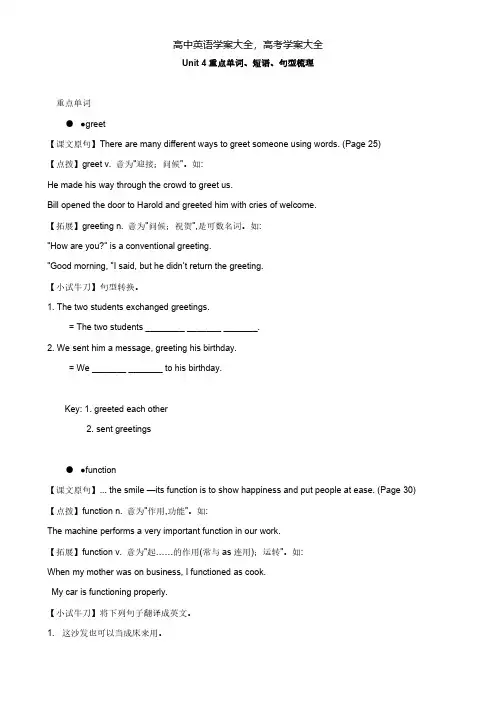
Unit 4重点单词、短语、句型梳理重点单词●●greet【课文原句】There are many different ways to greet someone using words. (Page 25)【点拨】greet v. 意为"迎接;问候"。
如:He made his way through the crowd to greet us.Bill opened the door to Harold and greeted him with cries of welcome.【拓展】greeting n. 意为"问候;祝贺",是可数名词。
如:"How are you?" is a conventional greeting."Good morning, "I said, but he didn’t return the greeting.【小试牛刀】句型转换。
1. The two students exchanged greetings.= The two students ________ _______ _______.2. We sent him a message, greeting his birthday.= We _______ _______ to his birthday.Key: 1. greeted each other2. sent greetings●●function【课文原句】... the smile —its function is to show happiness and put people at ease. (Page 30)【点拨】function n. 意为"作用,功能"。
如:The machine performs a very important function in our work.【拓展】function v. 意为"起……的作用(常与as连用);运转"。
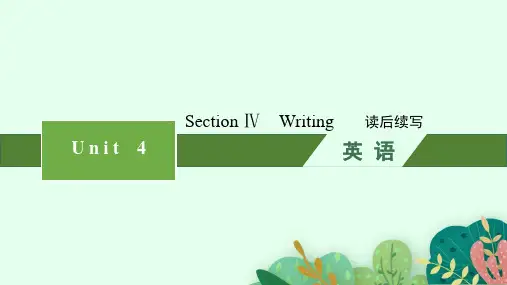
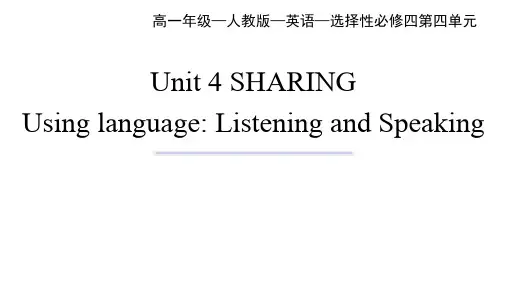
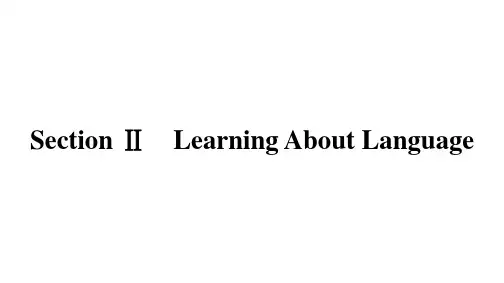
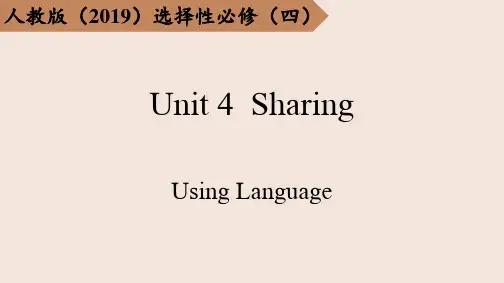
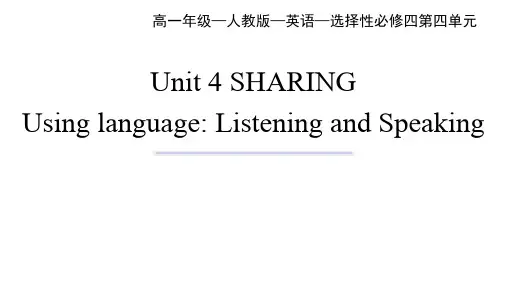
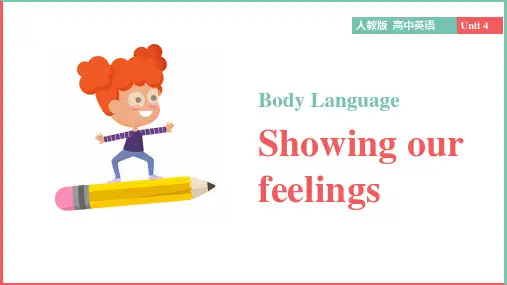
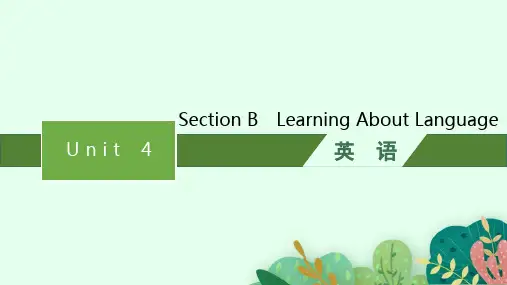

必修四Unit 1 Women of Achievement成功的妇女II.Reading A STUDENT OF AFRICAN WILDLIFE非洲野生动植物学生It is 5:45 am and the sun is just rising over Gombe National Park in East Africa.早上5:45分,太阳冉冉升起在东非的贡贝国家公园上,【注释:Gome National Park贡贝国家公园,位于东非的坦桑尼亚。
冈贝最常见的其他哺乳动物是灵长类。
人们从20世纪60年代开始,就一直对它们进行研究,发现橄榄树狒狒最为常见,经常成群结队在海滨流连,而红尾猴和疣猴则一直以森林作为天然篷幛,疣猴经常遭受黑猩猩的追猎。
】Following Jane’s way of studying chimps, our group are all going to visit them in the forest.按照詹尼研究黑猩猩的方法,我们这群人都将看到森林中的黑猩猩。
【注释:following Jane’s way of studying chimps是现在分词作状语。
】Jane has studied these families of chimps for many years and helped people understand how much they behave like humans.詹尼研究黑猩猩家族已有许多年了,她帮助人们理解黑猩猩怎样像人类一样地行为表现。
【注释:behave vi.(行为或举止)表现eg. He has behaved well at school.他在学校表现良好。
(2)工作eg. How is the new engine behaving?新的引擎运行得如何?】Watching a family of chimps wake up is our first activity of the day.观察黑猩猩一家起床是我们当天的第一项活动。
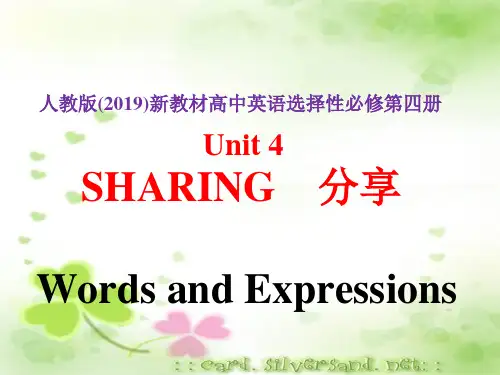
重点单词.词组讲解1. greet vt. 问候,迎接,招呼(+with)She greeted her guests at the door.She greeted him with a smile. greet sb.with...用……向某人打招呼(欢迎某人) greeting n. 招呼,问候She waved a friendly greeting.【期末测试】Whenever I met her, _________ was fairly often, she greeted me with a sweet smile.A. whoB. whichC. whenD. that【2013新课标2完形】23.A.helps B .chooses C. greets D. sees 【2013广东】The next day Tom appeared as the powerful Superman waving his hand to the people greeting him along the way.2. represent1)vt.象征;表示;The dove represents peace.2) vt.作为...的代表They said that they represented the committee. 他们说他们代表该委员会。
区别:represent,stand forrepresent “表示,代表,说明”多用于实体代表,有被动。
stand for “代表,意味”多用于抽象事物代表。
一般指符号或标志等,无被动。
The dove represents peace.U.N stands for the United Nations.【2015安徽】In many cultures, round foods such as grapes, bread, and moon cakes are eaten at welcome celebrations to represent family unity.3. association1)n.协会,公会,社团[C]Have you joined the teachers' association?2)n.联想,联想物[C][U]He has no association with foreigners. have (no)association with...与…有(没有)联系associate v.联想,把...联想在一起They associate turkey with Thanksgiving. associate...with...把……与……结合起来【2012北京完形】48. A. attention B. association C. attraction D. adaptation 【2014浙江】We associate piggy banks with children4.curious adj. 好奇的,渴望知道的The boy was curious about everything he saw. be curious about 对……感到好奇He’s curious to know what she said. be curious to do sth. 渴望做……curiously adv. 1. 好奇地2. 奇异地,奇怪地;说来古怪He looked curiously at the people.curiosity n. 好奇心She did that just out of curiosity. from/out of curiosity 出于好奇【期末测试】People have always been about exactly how life on earth began.A. curiousB. excitedC. anxiousD. careful【期末测试】Little Johnny felt the bag, curious to know what it ____.A. collectedB. containedC. loadedD. saved【2014新课标1】you can take a photo or write a poem that shows what they are curious about.5. approach vt. vi1) 接近,靠近(可指距离或时间)When I approached, they grew silent.2) 找...商量Did Mary approach you about lending her some money?approach sb. on/about sth.与某人接洽/商量某事名词n.1) 接近,靠近;即将达到[U][(+of)]Snow announced the approach of winter.2) 通道,入口[C][(+to)]All approaches to the village are blocked.3) 方法,方式;态度I like her approach to the problem. approach to 接近;近似;(做某事)的方法(途径) 可以与介词to搭配的名词有:answer/key,entrance,visit(or),way/road,guide,monument等。
人教版高中英语必修四外研社版篇一:外研版高一英语必修4各单元知识点归纳外研版高一必修4知识点归纳(各单元)Unit 1 Life in the Future重点词汇:alternative; arrest; brick; concrete; criminal; disability; entertainment重点短语in the future 将来 care for 照顾;关心 plenty of 大量的 think about考虑 instead of 代替 be able to能够attach to连接到;附属于 have an accident 发生意外;出事故 for a start开始 on the way out 在路上 a few of一些 be made of由…制成 throw away扔掉;丢弃 for sure 确定 place an order 排列顺序语言点用法过关1. alternative adj. 替换的,可供选择的(二者中)选择其一的考点归纳(1) alternative energy 替代能源 alternative ways 可供选择的方法(2) have no alternative but to do 除……别无选择as an alternative 作为一种变通的方法alternative to ……的替代物辨析:alternative 强调必须从两或多个中选一个choice 强调自由选择,不论选择的方式多或少preference 强调按自己喜欢的方式进行选择2. run out 用完;耗尽考点归纳run after 追求;追赶run at 冲向;突袭run away 逃走;逃跑 run into 偶然遇见;撞上;陷入3. rely on 依赖;依靠考点归纳rely on/ upon s./ 依赖/依靠rely on sb. to do sth. 指望某人做某事rely on it that… 相信…… 指望……辨析rely on 强调凭借经验判断是否可以相信或依赖,侧重于从人品、感情方面的依赖、信赖。
人教版高中英语必修四词汇表(带音标及原文例句)Book4 Unit11.achievement /ə'tʃi:vmənt/ n.[C] 成就;功绩[U] 完成;达到;实现She inspires those who want to cheer the achievements of women.她激励着那些为妇女们的成就而欢呼喝彩的人。
(p2)2. welfare /'welfeə/ n.[U] 福利;福利事业She concerned herself with welfare projects, especially the China Welfare Istitute for women and children. 她非常关心福利项目,尤其是中国的妇女儿童福利基金会。
(p1)3.project n.[C] /ˈprɒdʒekt/工程;项目;规划; 专题研究4. institute / 'ɪnstɪtju:t / n.[C] 学会;学院;协会5. △China Welfare Institute 中国福利基金会6. specialist/ˈspeʃəlɪst/ n.[C]专家;专业工作者Lin Qiaozhi was a doctor who became a specialist in women’s illnesses.林巧芝是一位妇女疾病方面的专家。
(p1)7. △ specialize /ˈspeʃəlaɪz/ vi.专攻;专门从事;专注于8. △chimp /tʃimp/ n.[C] (非洲)黑猩猩(口语)= chimpanzee |ˌtʃɪmpænˈzi:|9. connection /kə'nekʃən/ n.[C,U]连接;关联;关系Her research showed the connections between chimps and human beings. 她的研究表明了黑猩猩和人类之间是有联系的。
新高一必修1第四单元课文+翻译人教版高中英语新教材必修一课文(Unit 4 | Reading and Thinking)THE NIGHT THE EARTH DIDN’T SLEEP地球的一个不眠之夜Strange things were happening in the countryside of northeastern Hebei. For several days,the water in the village wells rose and fell,rose and fell. There were deep cracks that appeared in the well walls. At least one well had some smelly gas coming out of it. Chickens and even pigs were too nervous to eat,and dogs refused to go inside buildings. Mice ran out of the fields looking for places to hide,and fish jumped out of the water. At about 3:00 a.m., on 28 July 1976,bright lights were seen in the sky outside the city of Tangshan and loud noises were heard. But the city’s one million people were asleep as usual that night.河北省东北部的农村地区怪事连连:一连几天,村子里的井水升升降降,起起伏伏,井壁上出现了深深的裂缝。
至少有一口水井的裂缝冒出臭气。
鸡甚至猪都焦虑不安,不愿进食;狗拒绝进入屋内。
人教版高中英语必修四Unit 4课文翻译Unit 4 Body language―Reading―COMMUNICATION: NO PROBLEM?交际:没有问题了吗?Yesterday, another student and I, representing our university's student association, went to the Capital International Airport to meet this year's international students. 昨天,我和另一个学生代表我们学校的学生会,到首都国际机场迎接今年的留学生。
They were coming to study at Beijing University. We would take them first to their dormitories and then to the student canteen. 他们来北京大学学习。
我们会首先把他们带到宿舍,然后去学生食堂。
After half an hour of waiting for their flight to arrive, I saw several young people enter the waiting area looking around curiously. 在等了半个小时之后,我看见几个年轻人走进了等候区,好奇地向四周张望。
I stood for a minute watching them and then went to greet them. 站着观察了他们一分钟后,我便走过去跟他们打招呼。
The first person to arrive was Tony Garcia from Colombia, closely followed by Julia Smith from Britain. 第一个到达的是从哥伦比亚来的托尼?加西亚,随后紧跟着的是英国的朱莉娅?史密斯。
After I met them and then introduced them to each other, I was very surprised. 在与他们碰面并介绍他们彼此认识之后,我(对看到的情景)感到很吃惊。
Tony approached Julia, touched her shoulder and kissed her on the cheek! 托尼走进朱莉娅,摸了摸她的肩,亲了亲她的脸!She stepped back appearing surprised and put up her hands, as if in defence. 她后退了几步,看上去有些吃惊,并举起了手,好像是在自卫。
I guessed that there was probably a major misunderstanding. 我猜想这里可能有个很大的误会。
Then Akira Nagata from Japan came in smiling, together with George Cook from Canada. 随后,来自日本的永田明微笑着走了进来,同时进来的还有加拿大的乔治?库克。
As they were introduced,当我为他们做介绍George reached his hand out to the Japanese student.时,乔治把手伸向了这位日本学生。
Just at that moment, however, Akira bowed so his nose touched George's moving hand. 然而,就在那时,永田明正在鞠躬,所以他的鼻子碰到了乔治伸过来的手。
They both apologized - another cultural mistake! 两个人都互相道了歉——这又是一个文化差错!Ahmed Aziz, another international student, was from Jordan. 另一位留学生艾哈迈德?阿齐兹是约旦人。
When we met yesterday, he moved very close to me as I introduced myself. 我们昨天见面,我进行自我介绍时,他靠我很近。
I moved back a bit, but he came closer to ask a question and then shook my hand. 我往后退了一点儿,但是他又上前问了我一个问题,然后同我握手。
When Darlene Coulon from France came dashing through the door, she recognized Tony Garcia's smiling face. 当来自法国的达琳?库隆匆忙走进门的时候,她认出了托尼·加西亚微笑的面孔。
They shook hands and then kissed each other twice on each cheek, since that is the French custom when adults meet people they know. 两个人握了握手,并且在对方的面颊上吻了两下。
因为,法国成年人见到熟人通常就是这么做的。
Ahmed Aziz., on the contrary, simply nodded at the girls. 而艾哈迈德?阿齐兹却只是朝女孩们点了点头。
Men from Middle Eastern and other Muslim countries will often stand quite close to other men to talk but will usually not touch women.来自中东和一些穆斯林国家的男士在谈话时通常站得离其他男士很近,但一般不会与女士接触。
As I get to know more international friends, I learn more about this cultural "body language".随着认识的国际朋友越来越多,我也了解到更多不同文化背景下的“身体语言”。
Not all cultures greet each other the same way, nor are they comfortable in the same way with touching or distance between people. 各种文化背景下的人互致问候的方式不尽相同,身体接触和相互间距离的程度也并不一样。
In the same way that people communicate with spoken language, they also express their feelings using unspoken "language" through physical distance, actions or posture. 用口头语言交流的同时,人们还使用不出声的语言——身体间的距离、动作或姿态等,来表达情感。
English people, for example, do not usually stand very close to others or touch strangers as soon as they meet. 比如,英国人通常不会站得离别人太近,也不会一见面就(用身体)接触陌生人。
However, people from places like Spain, Italy orSouth American countries approach others closely and are more likely to touch them. 不过,来自西班牙、意大利或南美等国的人会站在离别人很近的地方,而且很可能(用身体)接触对方。
Most people around the world now greet each other by shaking hands, but some cultures use other现在世界上大greetings as well, such as the Japanese, who prefer to bow.多数人见面都要握手相互问候,但有些文化(背景下的人)会采取另外一些寒暄方式。
比如说,日本人就更愿意鞠躬。
These actions are not good or bad, but are simply ways in which cultures have developed. 这些行为都无所谓好与坏,只不过是文化发展的不同方式而已。
I have seen, however, that cultural customs for body language are very general - not all members of a culture behave in the same way. 然而,我发现身体语言的文化习俗是多元的——同一个(民族)文化中也并非所有成员的行为都一样。
In general, though, studying international customs can certainly help avoid difficulties in today's world of cultural crossroads! 但总的来说,在当今文化交融的世界,学习不同国家的习俗肯定能帮助我们避免交往中的困难。
Using LanguageReadingSHOWING OUR FEELINGS表达我们的情感Body language is one of the most powerful means of communication,often even more powerful than spoken language. 身体语言是最强有力的交际手段之一,甚至经常比口头语言更有力量。
People around the world show all kinds of feelings, wishes and attitudes that they might never speak aloud. 世界各地的人们表达各种各样的情感、愿望和态度,他们可能从来不会大声地说出来。